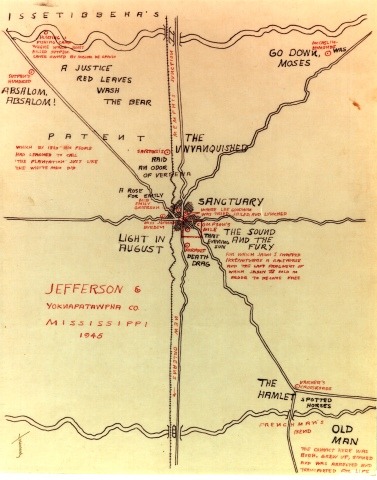
William Faulkner is considered to be one of the most influential Southern writers in the Twentieth Century. Born in Mississippi, Faulkner used his native Southern roots as inspiration for many of his great works. In his childhood, Faulkner drew great influence from his artistic and intelligent female relatives. He was raised in affluence, yet he was fascinated with the trials and triumphs of the poor, working class of Mississippi (Gordon). He began his literary journey in adolescence with the writing of poems. His works also include short stories, novels, and screenplays. As a young adult Faulkner attended Ole Miss, but only stayed enrolled in the university for three semesters before heading to New York. He worked odd jobs to support himself as he perused his literary passion. As a young man in the Deep South, Faulkner was very perplexed by the complexity of the “black versus white” ideas of society and used his first hand knowledge as content in his works (Contemporary Authors Online). Though Faulkner spent much of time in isolated in his home town, he did spend time overseas, which in turn introduced him to the stylings of early modernist literature. Through the modernist technique Faulkner experimented with “stream of consciousness” narrative and the use of dialect. He would often give the archetypal southern boy with a drawl in his voice and the look of a poor farm hand the ability for deep and perceptual thought (Gordon). In a single narrative it was not uncommon for Faulkner to use several characters’ perspectives to tell the story as a whole. One of the most frequent themes throughout his works was the conflicting moral depravity of the slave supporting South. Often Faulkner would reflect on the South’s deep seated racial tensions by portraying slave owners in the negative light they deserved (Contemporary Authors Online). In 1950 Faulkner was awarded the Nobel Peace Price in Literature for “"for his powerful and independent artistic contribution in America's new literature of the novel" (Fargnoli, Golay, and Hamblin). Faulkner spent a majority of his life living in his beloved home state Mississippi. Many of his narratives take place in the fictional Yoknapatawpha County which is based off the county in which he was raised (Fargnoli, Golay, and Hamblin). Faulkner died at the age of sixty-five and was laid to rest in Oxford, Mississippi surrounded by the natural world he so adored (Gordon).

Map of Lafayette County, the inspiration for Faulkner's fictional Yokapatawpha County.

Yoknapatawpha County
Works Cited
Contemporary Authors Online. “William Faulkner.” 02/25/2004. Gale Contemporary Authors Online. Tarrant County College Lib., Fort Worth, TX. Web. 11/01/2011. <http://ezp.tccd.edu >.
Fargnoli, Nicholas A., Michael Golay, and Robert W. Hamblin. "Faulkner, William." Critical Companion to William Faulkner: A Literary Reference to His Life and Work, Critical Companion. 2008. Bloom's Literary Reference Online. Facts On File, Inc. Tarrant County College Lib., Fort Worth, TX.Web . 11/01/2011. < http: //www.fofweb.com>.
Gordon, Debra. “Faulkner, William.” Bloom, Harold, ed. William Faulkner, Bloom's BioCritiques. 2002. Bloom's Literary Reference Online. Facts On File, Inc. Tarrant County College Lib., Fort Worth, TX.Web. 11/01/2011. <http://www.fofweb.com>.
No comments:
Post a Comment